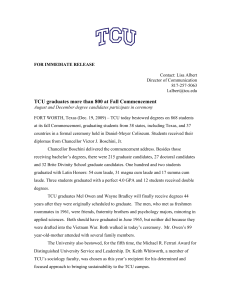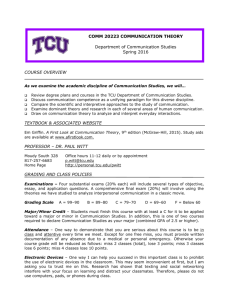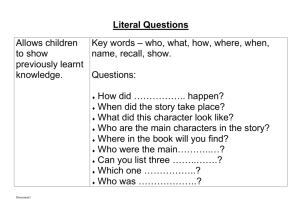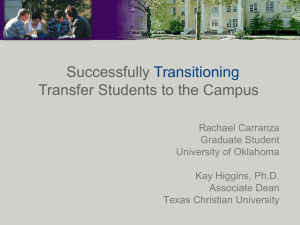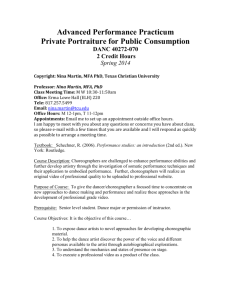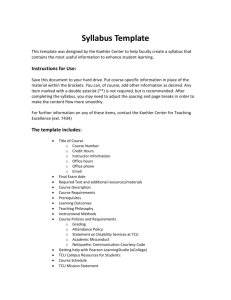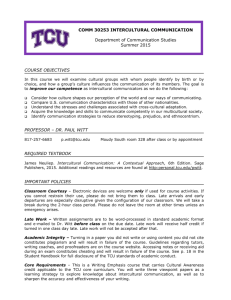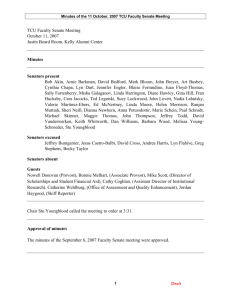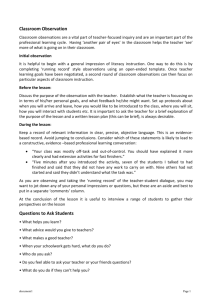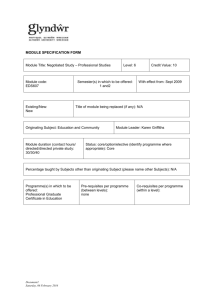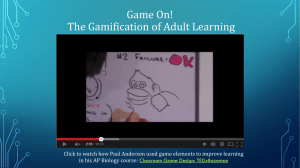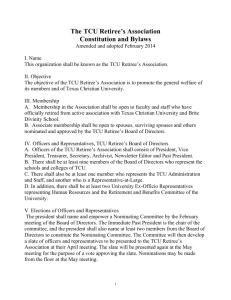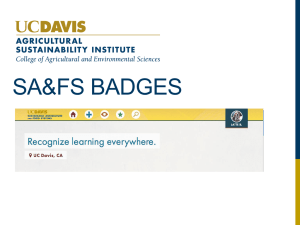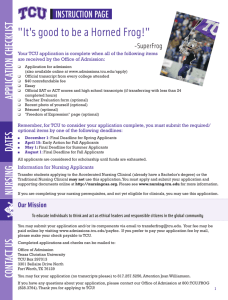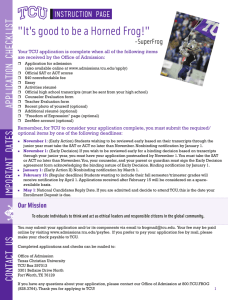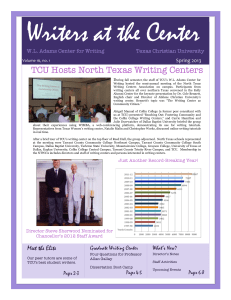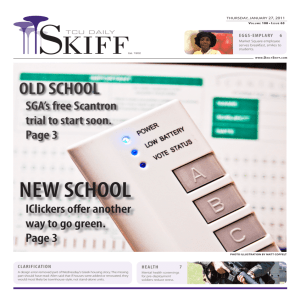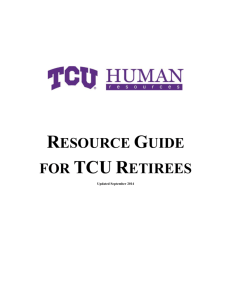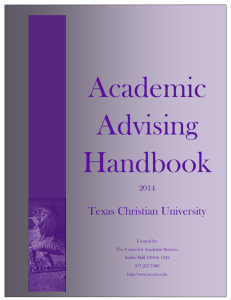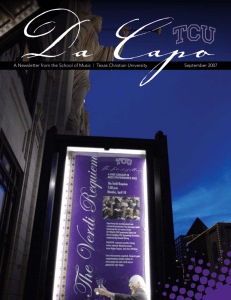Example Syllabus for 2013 Intermediate Reading
advertisement
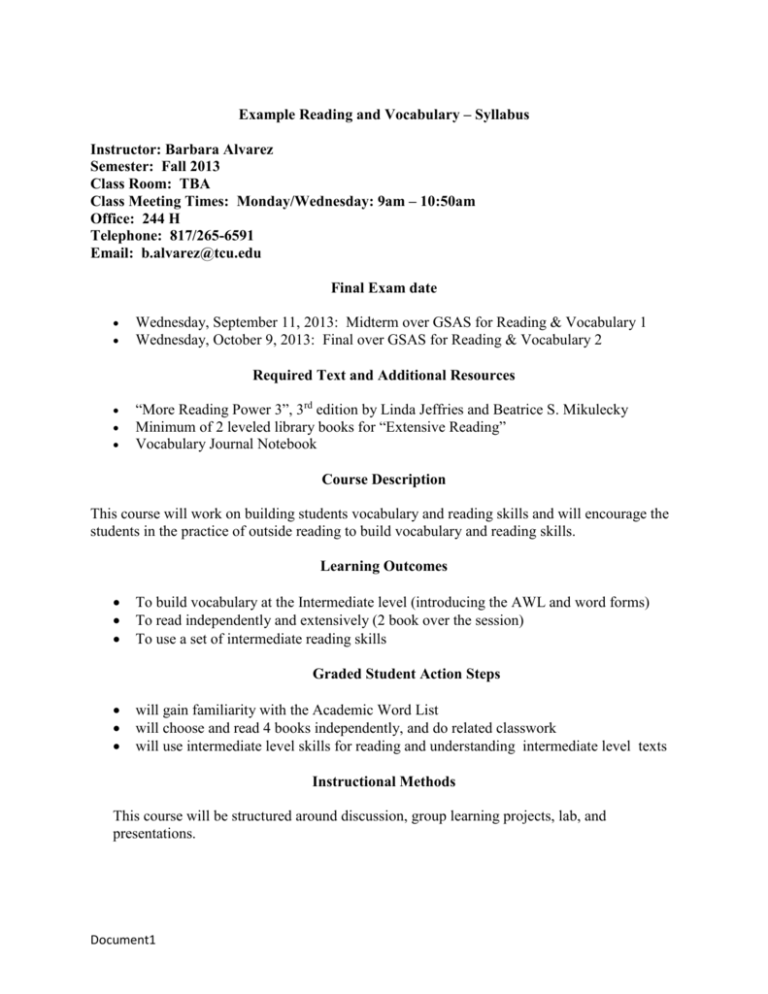
Example Reading and Vocabulary – Syllabus Instructor: Barbara Alvarez Semester: Fall 2013 Class Room: TBA Class Meeting Times: Monday/Wednesday: 9am – 10:50am Office: 244 H Telephone: 817/265-6591 Email: b.alvarez@tcu.edu Final Exam date Wednesday, September 11, 2013: Midterm over GSAS for Reading & Vocabulary 1 Wednesday, October 9, 2013: Final over GSAS for Reading & Vocabulary 2 Required Text and Additional Resources “More Reading Power 3”, 3rd edition by Linda Jeffries and Beatrice S. Mikulecky Minimum of 2 leveled library books for “Extensive Reading” Vocabulary Journal Notebook Course Description This course will work on building students vocabulary and reading skills and will encourage the students in the practice of outside reading to build vocabulary and reading skills. Learning Outcomes To build vocabulary at the Intermediate level (introducing the AWL and word forms) To read independently and extensively (2 book over the session) To use a set of intermediate reading skills Graded Student Action Steps will gain familiarity with the Academic Word List will choose and read 4 books independently, and do related classwork will use intermediate level skills for reading and understanding intermediate level texts Instructional Methods This course will be structured around discussion, group learning projects, lab, and presentations. Document1 Learning Philosophy Learn by doing. Learn from mistakes and have fun while learning. Course Policies and Requirements IEP Policies on Attendance and Punctuality The Official Texas Christian University policy on class attendance is clear and straightforward: Regular and punctual class attendance is essential, and no assigned work is summarily excused because of absence, no matter what the cause. Records of class attendance are the responsibility of the faculty, and every course’s syllabus should clearly state the instructor’s policy on class attendance and how attendance affects a student’s final evaluation in the course. Students who miss an instructional experience are expected to meet with faculty to discuss their absence as soon as possible. The IEP student must attend each class 100%. Moreover, students are expected to arrive to class on time. A student is considered tardy if s/he arrives after the class has started. Three tardies = one absence Tardiness after 10 minutes = one absence. The instructor may close the classroom door and not allow entry to the class after 10 minutes. Four absences = failure of the class If a student is absent on the day of a test, quiz, or presentation, make-ups will only be available if the student contacts the instructor before class time and provides to the instructor documentation of an illness, catastrophic illness, or family emergency. o If the student knows that he or she will be absent, the student must contact the instructor before class. o If student is sick, he or she should go to the TCU Health Center or see another health care provider. (Please note that if the Health Center believes that the student is unable to attend classes, the instructor will be emailed this professional opinion; simply going to the Health Center does not constitute permission to make up the missed work.) If any of the following conditions are true, the faculty member should contact the IEP assistant director or director, who may contact the TCU Campus Life Office: o The faculty member is concerned for the student’s health or well-being, or thinks the student needs additional help. o The student has had excessive absences in the class. Document1 Class Levels and Progress: The Badge System Students will be tested in grammar, writing, reading, and listening/speaking for placement into their core courses. Each student will have four core courses each term, with core courses running Monday through Thursday, and supplemental programming, advising, and digital support on Fridays. With the placement tests, a student will place into the Beginning, Intermediate, or Advanced Levels. At each level, the student is required to show proficiency by acquiring a specific number of Outcome, or Achievement, Badges. These badges represent mastery of specific skills. Students must earn two Outcome Badges in order to progress to the next level. Outcome Badges are earned by completing Action Steps and earning Action Badges. Each Outcome Badge requires the completion of three Action Step Badges. Badges are required to progress from one level to the next, and each badge has a required assessment at the end of the term. A student must receive a passing grade of A or B in each Action Badge area to show mastery of the skill and to receive the Outcome Badge for that unit. Probation: A student goes on probation: If he/she receives an F in any class, If he/she has failed to earn 3 badges of student outcome (BSO) in any given skill class after completing two consecutive sessions, If he/she fails to earn BSOs in the Workshop and Student Success class in any given session A student will be on probation until: They successfully complete the program Fail to meet the probation requirements Probation requirements include: Passing all classes Completion of at least one BSO per each class every session Achieving 3 or more BSOs per skill class every two sessions Achieving the BSO for both Workshop and Student Success class each session A student who fails to meet probation requirements: will not be allowed to register for IEP classes. S/he must work with an advisor in the Office of International Services to ensure that legal immigration is maintained by immediately either transferring his/her SEVIS record to another institution, returning to his/her country, or applying for a change of visa status. Failure to fulfill the requirements of probation is also failure to meet the requirements of F and J visas. Students who do not meet these requirements are in violation of their status and must apply for reinstatement. Document1 Grading Final Grade Elements: Percent / Point Value 25% 25% 25% 25% Item 25% 25% 25% 25% Reading & Vocabulary 2 Homework Assignments Reading & Vocabulary 2 Quizzes Reading & Vocabulary 2 Journal Reading & Vocabulary 2 Test Reading & Vocabulary 1 Homework Assignments Reading & Vocabulary 1 Quizzes Reading & Vocabulary 1 Journal Reading & Vocabulary 1 Test Final Numerical Grade Calculation (+/-): Grade A AB+ B BC+ C CD+ D DF Score 94-100 90-93 87-89 84-86 80-83 77-79 74-76 70-73 67-69 64-66 60-63 0-59 Final Letter Grade Calculation: Grade A B C D F Score 90-100 80-89 70-79 60-69 0-59 Document1 Statement of Disability Services at TCU Disability Statement approved Fall 2007 by the Undergraduate Council / Revised Summer 2011 Disabilities Statement: Texas Christian University complies with the Americans with Disabilities Act and Section 504 of the Rehabilitation Act of 1973 regarding students with disabilities. Eligible students seeking accommodations should contact the Coordinator of Student Disabilities Services in the Center for Academic Services located in Sadler Hall, 1010. Accommodations are not retroactive, therefore, students should contact the Coordinator as soon as possible in the term for which they are seeking accommodations. Further information can be obtained from the Center for Academic Services, TCU Box 297710, Fort Worth, TX 76129, or at (817) 257-6567. [Note: The following two paragraphs may be included, but are not required.] Adequate time must be allowed to arrange accommodations and accommodations are not retroactive; therefore, students should contact the Coordinator as soon as possible in the academic term for which they are seeking accommodations. Each eligible student is responsible for presenting relevant, verifiable, professional documentation and/or assessment reports to the Coordinator. Guidelines for documentation may be found at http://www.acs.tcu.edu/disability_documentation.asp. Students with emergency medical information or needing special arrangements in case a building must be evacuated should discuss this information with their instructor/professor as soon as possible. Academic Misconduct: **Academic Misconduct (Sec. 3.4 from the Student Handbook) –Any act that violates the academic integrity of the institution is considered academic misconduct. The procedures used to resolve suspected acts of academic misconduct are available in the offices of Academic Deans and the Office of Campus Life and are listed in detail in the Undergraduate Catalog (Student Policies>Academic Conduct Policy Details; http://www.catalog.tcu.edu/current_year/undergraduate/). Specific examples include, but are not limited to: Cheating: Copying from another student’s test paper, laboratory report, other report, or computer files and listings; using, during any academic exercise, material and/or devices not authorized by the person in charge of the test; collaborating with or seeking aid from another student during a test or laboratory without permission; knowingly using, buying, selling, stealing, transporting, or soliciting in its entirety or in part, the contents of a test or other assignment unauthorized for release; substituting for another student or permitting another student to substitute for oneself. ?????another’s work, and the unacknowledged submission or incorporation of that work as one’s own offered for credit. Appropriation includes the quoting or paraphrasing of another’s work without giving credit therefore. I will be using http://www.turnitin.com for plagiarism detection. Document1 Collusion: The unauthorized collaboration with another in preparing work offered for credit. Netiquette: Communication Courtesy Code All members of the class are expected to follow rules of common courtesy in all email messages, threaded discussions and chats. If I deem any of them to be inappropriate or offensive, I will forward the message to the Chair of the department and the online administrators and appropriate action will be taken, not excluding expulsion from the course. The same rules apply online as they do in person. Be respectful of other students. Foul discourse will not be tolerated. Please take a moment and read the following link concerning "netiquette". http://www.albion.com/netiquette/ Participating in the virtual realm, including social media sites and shared-access sites sometimes used for educational collaborations, should be done with honor and integrity: http://ctlt.ubc.ca/distance-learning/learner-support/communicating-online-netiquette/ TCU Campus Resources for Students **TCU Campus Resources for Students: Many resources exist on the TCU campus that may be helpful to students: Mary Couts Burnett Library (257-7117); Center for Academic Services (2577486, Sadler Hall. 1022); the William L. Adams Writing Center (257-7221, Reed Hall 419); Student Development Services (257-7855, BLUU 2003); and Office of Religious & Spiritual Life (257-7830, Jarvis Hall), Campus Life (257-7926, Sadler Hall 2006), and the Counseling, Testing, and Mental Health Center (257-7863, Brown Lupton Health Center). **Email Notification: Only the official TCU student email address will be used for all course notification. It is your responsibility to check your TCU email on a regular basis. Document1 Course Schedule [number and dates of exams must be included] **the specific day-to-day or week-to-week schedule is not required, but it is encouraged Date Day 1 2 3 4 Document1 Aug. 19 Aug. 21 Sept. 26 Sept. 28 Topic Reading Assignment
